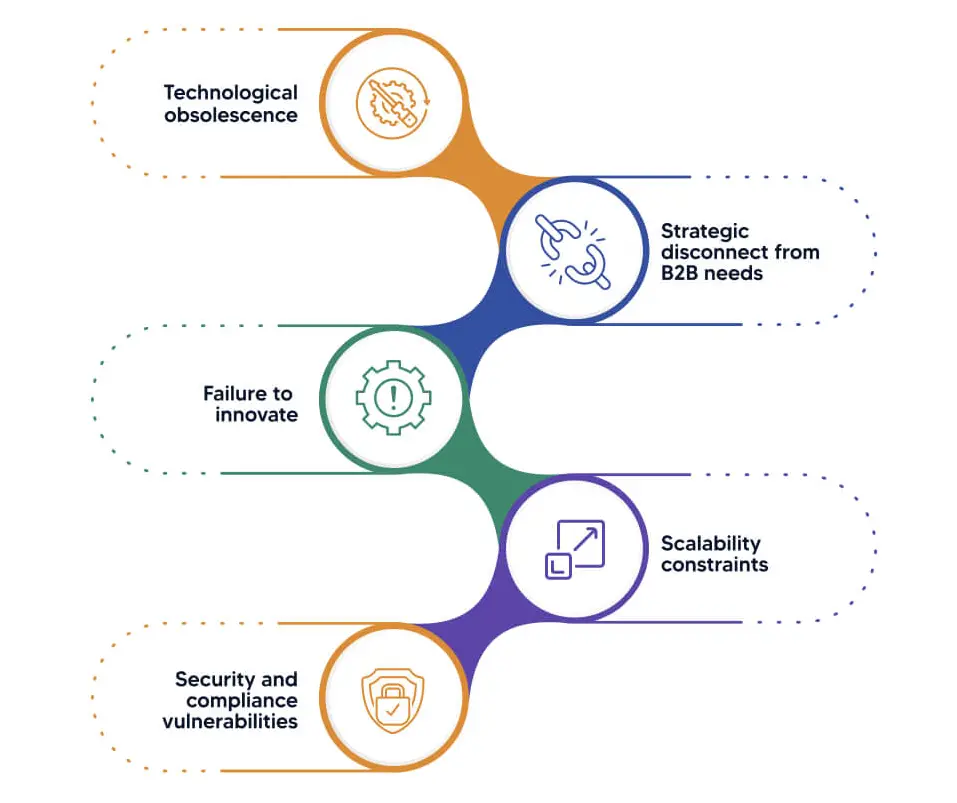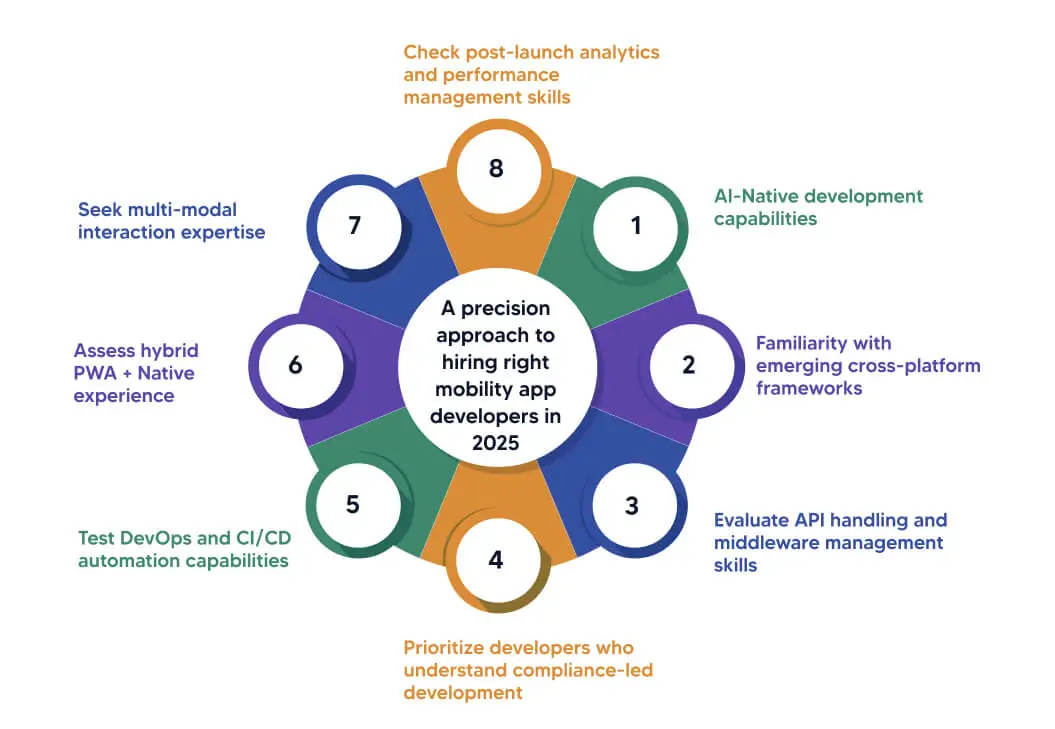Other recent blogs


Let's talk
Reach out, we'd love to hear from you!
In 2025, mobile apps will be the cornerstone of B2B enterprise success. With over 80% of the world using smartphones and 5G powering lightning-fast, data-rich solutions, companies are harnessing mobile technology to revolutionize customer interactions, optimize operations, and tap into new revenue opportunities.
From AI-enhanced logistics tools to IoT-connected field service systems, the demand for tailored mobile solutions is skyrocketing. However, the line between a game-changing app and a costly failure comes down to one pivotal choice: selecting the proper mobility app developer. A bad hire can derail your mobile app development project. At the same time, an exceptional developer with a seasoned skillset can deliver a scalable and high-impact solution that drives measurable business growth.
The high-stakes risks of hiring the wrong mobility app developer

Picking the wrong mobile developer means you may face major setbacks throughout your app development cycle. This may interfere with how well the app performs and damage the company’s edge over other organizations. Because mobile apps act as key parts of business processes and customer connections, B2B companies feel the consequences of bad hires more strongly than others. These risks highlight the need for a rigorous, forward-thinking approach to hiring developers who not only possess technical expertise but also align with your strategic vision and industry demands.
Here’s a deeper look at the risks and their implications:
- Technological obsolescence:
The mobile app world in 2025 features WebAssembly, an advanced tool that allows near-native performance, GraphQL for clean API communications, and TensorFlow Lite as a helpful AI tool. Programmers who are not skilled in these areas may produce programs that are quickly left behind, provide no benefit from 5G, and do not meet expectations for speed and stability. This may cause users to find your site slow and discourage people from using it, which hurts your ROI. - Strategic disconnect from B2B needs:
B2B apps must seamlessly integrate with complex enterprise ecosystems, such as SAP, Salesforce, or Oracle ERP systems, to drive operational efficiency. Lacking a clear understanding of various B2B workflows, developers could build apps that separate important data or impact essential activities. As a result of this imbalance, additional work may be required, stakeholders might become displeased, and opportunities to get better results might be lost. - Failure to innovate:
In 2025, users want technology to be able to personalize experiences, process data fast with edge computing, and interact using AR/VR. If developers stick to outdated designs and do not learn about new programming methods, the applications they design are likely to seem dull and indistinguishable. If B2B firms are slow to innovate, it may reduce the level of customer engagement and be less competitive with companies that move faster. - Scalability constraints:
Enterprise-grade software has to stand up to strong user growth, keep up with advancing technology, and aid in growing the business for years to come. If an application is built as a single unit (monolithic) instead of with microservices and important cloud principles are not used, it can become harder to expand. As a result, your application may not perform as well with many users, might need expensive improvements, or lack the ability to add new features, which can jeopardize its lasting success. - Security and compliance vulnerabilities:
With data breaches costing enterprises an average of $4.5 million in 2025 and regulations like GDPR 2.0, CCPA, and industry-specific standards (e.g., HIPAA for healthcare, PCI-DSS for finance) tightening, security is non-negotiable. Inexperienced developers may miss out on essential tasks such as securing the environment with zero trust, safeguarding confidential data, or routinely assessing for vulnerabilities. Not addressing these mistakes can lead to cyber-attacks, serious legal consequences, and harm to your business’s reputation, mainly in industries that value trust the most.
A precision approach to hiring right mobility app developers in 2025

- AI-Native development capabilities
In 2025, mobile apps will focus on using AI to make them more intelligent than just buttons and screens. While checking a developer’s portfolio, verify that they have experience with on-device AI so that the AI is not limited to the cloud. Are they able to use Core ML or ML Kit to handle data safely right on the device? Have they included features such as AI for recommendations and analyzing the sentiment of feedback locally? Because of this, a smart developer is distinguished from one who just writes plain applications. - Familiarity with emerging cross-platform frameworks
React Native and Flutter aren’t the only options anymore. Nowadays, innovative businesses include multiple devices in their design, such as wearables, foldables, and infotainment systems. KMM or Capacitor JS users have an advantage when developing this set of operating systems. Ask them to describe how they would address rolling out a single app to work on multiple devices. If their approach is based on the latest trends or, more adaptable solutions will show. - Evaluate API handling and middleware management skills
Mishandling backend integrations by a developer can lead to poor performance of your app. Modern mobile apps can reach out to dozens of APIs, microservices, and outside systems. Pay attention to whether the developer can deal with API management, caching, error handling, and strategies for working with information even when offline. Is there a method that mobile app developers can use to make sure their apps stay stable when the network is unpredictable? The development team’s approach to middleware and APIs can reveal a great deal about their ability. - Prioritize developers who understand compliance-led development
Regulations like the Indian DPDP and increases in regulations everywhere have turned compliance into a key design principle. When building applications, developers should know how to handle data consent, how to anonymize user data, and safely manage both local and cloud storage. Find out if the company can present cases of apps they have developed for groups like healthcare or financial services. Knowing these obligations prevents you from facing expensive legal issues and having to deal with negative media attention. - Test DevOps and CI/CD automation capabilities
Developing an app goes beyond coding; you have to consider how it will be released. Anyone who builds an app should know tools like Bitrise, GitHub Actions, or Codemagic to handle automated builds, testing, and updates. To practice, challenge your candidates on how they would introduce a major feature update to users in both app stores, slowly. Using automation for building, testing, and rolling back changes should be part of their process, as it proves they can provide reliable new updates swiftly. - Assess hybrid PWA + Native experience
As stricter rules in app stores make things harder for developers, more people are using progressive web apps (PWAs). People making apps need to recognize when a PWA can do better than native, and manage to combine the two successfully. Request from candidates their approach to developing a customer loyalty app for the tier-2 cities where app adoption is low. Would they suggest migrating to a PWA in case of issues? What would they do about receiving messages and being able to use the app when no internet is available? It makes it clear that developers consider real-world factors before writing code. - Seek multi-modal interaction expertise
Smartphones and tablets are not the only devices that use apps anymore. Using speech, hand gestures, and car infotainment is now accepted by most people. Be sure to ask developers whether they have used SiriKit, Google Assistant, or gesture navigation in their apps. Show them a situation, for example, helping the visually impaired by making navigation possible through voice alone, and then observe how they would solve the challenge. As a result, your app is prepared for any future updates and welcomes diverse users. - Check post-launch analytics and performance management skills
An app’s real performance can only be judged once it is launched. Check that your developer can set up and use Firebase Crashlytics, Instabug, and ASO systems. Look into the ways they check for any issues, boost performance, and measure user retention within the first three months. Their capacity to use insights from analytics is key to ongoing improvements in a product. Those who continue to improve their game after launch tend to stand by their games for a long time.
Kellton: Your Strategic Partner for Mobile Innovation
In a landscape where precision and innovation define success, Kellton emerges as a trusted ally for B2B enterprises planning to hire mobility developer to launch the robust mobile apps. At Kellton, our team combines deep industry expertise with a future-ready agile approach to mobile app development while leveraging AI, IoT, and cloud-native architectures to deliver apps that drive measurable business impact.
Be it optimizing supply chains or enhancing customer engagement, or accelerating digital transformation, Kellton’s agile-first methodology ensures rapid delivery without compromising quality. Partner with Kellton to transform your mobile vision into a competitive advantage, backed by strategic insight and technical excellence.
Frequently Asked Questions
What is the future of mobile app development in 2025?
In 2025, mobile apps evolve with AI-driven personalization, edge computing for low-latency experiences, and Web3 for decentralized functionality. 5G enables real-time IoT integration, while low-code platforms accelerate development for niche B2B use cases. Security remains paramount with zero-trust architectures becoming standard.
How to hire the best mobile app development company?
At Kellton, we offer specialized B2B expertise and a track record in delivering scalable apps, and proficiency in 2025’s tech trends (AI, IoT, 5G). Evaluate their ability to align with your strategic goals and deliver end-to-end solutions. Kellton’s tailored approach ensures unmatched value and reliability.
How to choose the right app developer?
Target developers with niche expertise in your industry, proficiency in modern frameworks, and a strategic mindset. Assess their ability to deliver scalable, secure apps through scenario-based tests and portfolio reviews. Prioritize alignment with your business vision.
How much does it cost to hire a mobile app developer?
Mobile app development costs depend on project complexity, tech stack, and developer expertise. Also, the pricing may vary if you are hiring mobile developer for more specialized technologies like AI, AR, or IoT - the rates may be higher.




